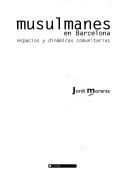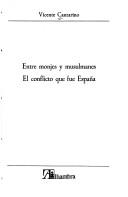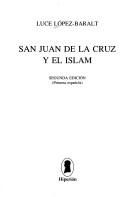| Listing 1 - 10 of 12 | << page >> |
Sort by
|
Book
ISSN: 15707571 ISBN: 9789004364981 9004364986 9004364994 9789004364998 Year: 2018 Volume: 28 Publisher: Leiden : Brill.
Abstract | Keywords | Export | Availability | Bookmark
 Loading...
Loading...Choose an application
- Reference Manager
- EndNote
- RefWorks (Direct export to RefWorks)
Islam in Spain has been transformed from a historical to a social matter in recent decades, attracting the attention of experts from a variety of disciplines. However, contributions to the field have been somewhat disperse. The multidisciplinary nature of the research done -mainly by specialists in Islamic Studies, Anthropology, Sociology and Law- has not been conducive to debates between specialists or to the publication of comprehensive works that recognize the wealth of views and findings. Observing Islam in Spain contains the keys to understanding current debates about the presence of Muslim citizens in Spain with regard to symbolism and public space, the law, ritual, the question of re-Islamization and the association-building and political participation of young people and women. Contributors are Marta Alonso Cabré, José María Contreras Mazarío, Khalid Ghali, Aitana Guia, Alberto López Bargados, Salvatore Madonia, Laura Mijares, Jordi Moreras, Ana I. Planet Contreras, Ángeles Ramírez, Óscar Salguero Montaño, Ariadna Solé Arraràs and Virtudes Téllez Delgado.
Muslims --- Islam --- Spain --- Ethnic relations --- Mohammedanism --- Muhammadanism --- Muslimism --- Mussulmanism --- Religions --- Muslims - Spain --- Islam - Spain --- Spain - Ethnic relations
Book
ISBN: 8489561478 9788489561472 Year: 2004 Publisher: Pamplona Navarra gráfica ediciones
Abstract | Keywords | Export | Availability | Bookmark
 Loading...
Loading...Choose an application
- Reference Manager
- EndNote
- RefWorks (Direct export to RefWorks)
Muslims --- Islam --- Religious institutions --- Legal status, laws, etc. --- 297 <460> --- Islam. Mohammedanisme--Spanje --- Muslims - Legal status, laws, etc. - Spain --- Muslims - Spain --- Islam - Spain --- Religious institutions - Spain

ISBN: 8487072186 9788487072185 Year: 1999 Publisher: Barcelona : CIDOB Edicions,
Abstract | Keywords | Export | Availability | Bookmark
 Loading...
Loading...Choose an application
- Reference Manager
- EndNote
- RefWorks (Direct export to RefWorks)
Muslims --- Immigrants --- Islam --- Barcelona (Spain) --- Ethnic relations --- Emigration and immigration --- Ethnic relations. --- Emigration and immigration. --- Muslims - Spain - Barcelona --- Immigrants - Spain - Barcelona --- Islam - Spain - Barcelona --- Barcelona (Spain) - Ethnic relations --- Barcelona (Spain) - Emigration and immigration
Book
ISBN: 888334202X 9788883342028 Year: 2006 Volume: 1 Publisher: Roma : Viella,
Abstract | Keywords | Export | Availability | Bookmark
 Loading...
Loading...Choose an application
- Reference Manager
- EndNote
- RefWorks (Direct export to RefWorks)
Jews --- Christians --- Muslims --- Juifs --- Chrétiens --- Musulmans --- Spain --- Espagne --- Ethnic relations --- History --- Church history --- Relations interethniques --- Histoire --- Histoire religieuse --- Islam --- Christianity --- Judaism --- Religions --- Relations --- Religion --- Civilization --- Chrétiens --- History. --- Islam - Spain - History --- Christianity - Spain - History --- Judaism - Spain - History --- Religions - Relations --- Spain - Religion --- Spain - Civilization
Book
ISBN: 2252019018 9782252019016 Year: 1977 Volume: 6 Publisher: Paris : Klincksieck,
Abstract | Keywords | Export | Availability | Bookmark
 Loading...
Loading...Choose an application
- Reference Manager
- EndNote
- RefWorks (Direct export to RefWorks)
Christianity and other religions --- Islam --- Moriscos. --- Islam. --- Relations --- Christianity. --- History. --- History --- -Moriscos --- Mudéjares --- -Judaïsme. Jodendom--Spanje --- -Muslims --- Moriscos --- 296 <460> --- Muslims --- Mohammedanism --- Muhammadanism --- Muslimism --- Mussulmanism --- Religions --- Relations&delete& --- Christianity --- Judaïsme. Jodendom--Spanje --- Islam - Spain - History --- Islam - Relations - Christianity --- Christianity and other religions - Islam
Book
ISBN: 022627831X Year: 2015 Publisher: Chicago : University of Chicago Press,
Abstract | Keywords | Export | Availability | Bookmark
 Loading...
Loading...Choose an application
- Reference Manager
- EndNote
- RefWorks (Direct export to RefWorks)
In the sixteenth and seventeenth centuries, competing scholarly communities sought to define a Spain that was, at least officially, entirely Christian, even if many suspected that newer converts from Islam and Judaism were Christian in name only. Unlike previous books on conversion in early modern Spain, however, Parables of Coercion focuses not on the experience of the converts themselves, but rather on how questions surrounding conversion drove religious reform and scholarly innovation. In its careful examination of how Spanish authors transformed the history of scholarship through debate about forced religious conversion, Parables of Coercion makes us rethink what we mean by tolerance and intolerance, and shows that debates about forced conversion and assimilation were also disputes over the methods and practices that demarcated one scholarly discipline from another.
Moriscos. --- Muslims --- Jews --- Spanish literature --- Conversion to Christianity --- History and criticism. --- Catholic Church --- History. --- Spain --- Intellectual life --- conversion, religion, islam, spain, history, christianity, pluralism, judaism, religious reform, scholarship, tolerance, intolerance, assimilation, moriscos, jews, muslims, catholic church, literature, spirituality, belief, nonfiction, heresy, theology, canon, philology, orthodoxy, ritual, faith, political science, politics, economics, iberian studies, new world, secularism.
Book
ISBN: 022632737X 9780226327372 9780226327068 022632706X 9780226327235 022632723X Year: 2016 Publisher: Chicago London
Abstract | Keywords | Export | Availability | Bookmark
 Loading...
Loading...Choose an application
- Reference Manager
- EndNote
- RefWorks (Direct export to RefWorks)
For more than a century, urban North Africans have sought to protect and revive Andalusi music, a prestigious Arabic-language performance tradition said to originate in the "lost paradise" of medieval Islamic Spain. Yet despite the Andalusi repertoire's enshrinement as the national classical music of postcolonial North Africa, its devotees continue to describe it as being in danger of disappearance. In The Lost Paradise, Jonathan Glasser explores the close connection between the paradox of patrimony and the questions of embodiment, genealogy, secrecy, and social class that have long been central to Andalusi musical practice. Through a historical and ethnographic account of the Andalusi music of Algiers, Tlemcen, and their Algerian and Moroccan borderlands since the end of the nineteenth century, Glasser shows how anxiety about Andalusi music's disappearance has emerged from within the practice itself and come to be central to its ethos. The result is a sophisticated examination of musical survival and transformation that is also a meditation on temporality, labor, colonialism and nationalism, and the relationship of the living to the dead.
Music --- Arabs --- Urban ecology (Sociology) --- Ethnomusicology --- History and criticism. --- Spanish influences. --- Andalusia (Spain) --- Civilization --- Islamic influences. --- andalusi music, urban, north africa, arabic, performance, tradition, medieval, islam, spain, national identity, postcolonialism, colonialism, empire, patrimony, embodiment, genealogy, heritage, secrecy, class, race, algiers, morocco, tlemcen, borderlands, nonfiction, history, anthropology, sociology, art, temporality, labor, nationalism, influence, ethnomusicology, andalusia, algeria, genre, revival.

ISBN: 8420503932 9788420503936 Year: 1978 Volume: 5 Publisher: Madrid Alhambra
Abstract | Keywords | Export | Availability | Bookmark
 Loading...
Loading...Choose an application
- Reference Manager
- EndNote
- RefWorks (Direct export to RefWorks)
Christianity --- Islam --- Spain --- Civilization --- -Islam --- -Mohammedanism --- Muhammadanism --- Muslimism --- Mussulmanism --- Religions --- Muslims --- Church history --- -Christianity --- Espanja --- Spanien --- Hiszpania --- Spanish State --- España --- Estado Español --- Espagne --- Hispania --- Sefarad --- Sepharad --- Shpanye --- Shpanie --- Reino de España --- Kingdom of Spain --- Reino d'Espanya --- Reinu d'España --- Espainiako Erresuma --- Regne d'Espanya --- Reiaume d'Espanha --- Espanya --- Espanha --- スペイン --- Supein --- イスパニア --- Isupania --- -History of Spain --- Religious studies --- History of Spain --- Mohammedanism --- Christianity - Spain --- Islam - Spain --- Spain - Civilization - 711-1516
Book
ISBN: 2503517099 9782503517094 9782503537375 Year: 2005 Volume: [4] Publisher: Turnhout Brepols
Abstract | Keywords | Export | Availability | Bookmark
 Loading...
Loading...Choose an application
- Reference Manager
- EndNote
- RefWorks (Direct export to RefWorks)
Depuis l’invasion arabo-berbère de la Péninsule ibérique en 711, les sociétés hispaniques chrétiennes sont très affectées par la guerre. Aux alentours de l’an mil, cette guerre prend une nouvelle dimension. Après une période de conflits internes et de défaites, culminant lors des fameux raids d’al-Mansûr, les principautés chrétiennes prennent l’offensive.A cet égard, l’an mil constitue bien un tournant dans l’histoire de l’Espagne chrétienne. Vers le milieu du onzième siècle, la Reconquista est en marche, tandis que quatre forces politiques s’imposent: les royaumes de León, de Pampelune et d’Aragon, et les comtés catalans. La multiplication des conflits influe très fortement sur l’organisation des pouvoirs civils, et implique des enjeux fondamentaux dans la genèse des Espagnes chrétiennes médiévales, qui connaissent alors de profondes mutations culturelles, juridiques et idéologiques.Les 26, 27 et 28 septembre 2002, plusieurs historiens et historiens de l’art venus de France, d’Espagne et d’Allemagne se sont retrouvés au Centre d’Etudes Supérieures de Civilisation Médiévale de Poitiers et à Angoulême pour travailler sur ces thèmes. Ils ont suivi trois axes de recherche, qui structurent les actes de ce colloque: la rencontre des mondes chrétien et musulman, la guerre comme enjeu de pouvoir et la dimension religieuse des idéologies.
History of Spain --- anno 900-999 --- anno 1000-1099 --- Colloques --- Colloquia --- Espagne ; histoire du Moyen Age --- Spanje ; geschiedenis van de Middeleeuwen --- Ideology --- Idéologie --- History --- Congresses --- Histoire --- Congrès --- Spain --- Espagne --- Politics and government --- Politique et gouvernement --- Ideology--Spain--History--Congresses. --- Church history --- Islam --- Christianity and other religions --- Relations --- Christianity --- Religion --- Philosophy & Religion --- Spain--Politics and government--To 1479--Congresses. --- Idéologie --- Congrès --- To 1479 --- Congresses. --- Church history - Middle Ages, 600-1500 - Congresses --- Islam - Spain - History - To 1500 - Congresses --- Christianity and other religions - Islam - History - To 1500 - Congresses --- Islam - Relations - Christianity - History - To 1500 - Congresses --- Spain - History - 711-1516 - Congresses --- Syncretism (Christianity) --- Religions --- Mohammedanism --- Muhammadanism --- Muslimism --- Mussulmanism --- Muslims

ISBN: 8475173055 9788475173054 Year: 1990 Volume: 129 Publisher: Madrid Hiperion
Abstract | Keywords | Export | Availability | Bookmark
 Loading...
Loading...Choose an application
- Reference Manager
- EndNote
- RefWorks (Direct export to RefWorks)
Spanish poetry --- Islam --- Arab influences. --- John of the Cross, --- Religion. --- 860 "15" JOANNES A CRUCE --- -Islam --- -Mohammedanism --- Muhammadanism --- Muslimism --- Mussulmanism --- Religions --- Muslims --- Spanish literature --- Spaanse literatuur--?"15"--JOANNES A CRUCE --- Arab influences --- John of the Cross Saint --- -Religion --- -Spaanse literatuur--?"15"--JOANNES A CRUCE --- 860 "15" JOANNES A CRUCE Spaanse literatuur--?"15"--JOANNES A CRUCE --- -860 "15" JOANNES A CRUCE Spaanse literatuur--?"15"--JOANNES A CRUCE --- Mohammedanism --- Alvarez, Juan de Yepes y, --- Giovanni della Croce, --- Ioann Kresta, --- Jan od Krzyża, --- Jean de la Croix, --- Joan, --- Joannes a Cruse, --- Joannes van het Kruis, --- João da Cruz, --- Johannes av Korset, --- Johannes vom Kreuz, --- John, --- Juan de la Cruz, --- Juan, --- Juan de Santo Matía, --- Św. Jan od Krzyża, --- Yepes, Juan de, --- Yepes y Alvarez, Juan de, --- Ĭoan vid Khresta, --- Йоан від Хреста, --- Spanish poetry - Arab influences. --- Islam - Spain. --- John of the Cross, - Saint, - 1542-1591 - Religion. --- John of the Cross, - Saint, - 1542-1591
| Listing 1 - 10 of 12 | << page >> |
Sort by
|

 Search
Search Feedback
Feedback About UniCat
About UniCat  Help
Help News
News